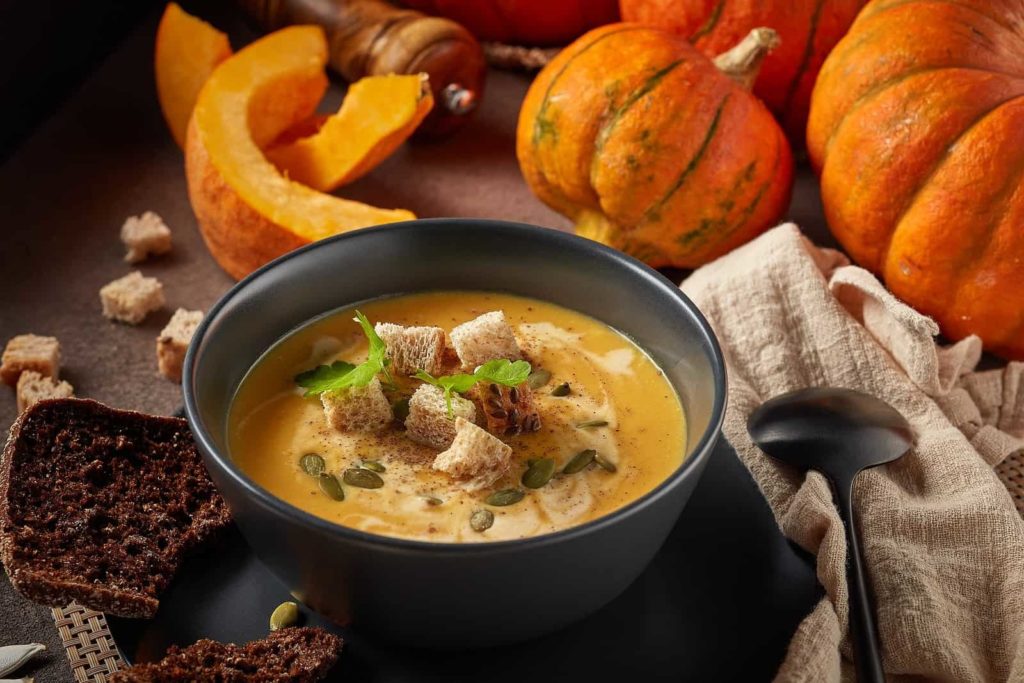You’re probably already seeing a wide variety of pumpkin spice-flavored foods and drinks like lattes, breakfast cereals, doughnuts, cookies … and on and on and on. While all these capture the flavor of pumpkin and the feeling of fall, they’re loaded with added sugar and won’t give you the health benefits of pumpkin. And, yes, there are a bunch of health benefits of pumpkin. If that surprises you, read on.
What are the health benefits of pumpkin?
Pumpkin is considered a nutrient-dense food, which means it’s incredibly low in calories but packed with vitamins and minerals. It’s also a good source of fiber. One cup of cooked pumpkin contains theses antioxidants and nutrients:
- Vitamin A: 245% of the Recommended Dietary Intake (RDI)
- Vitamin C: 19% of the RDI
- Potassium: 16% of the RDI
- Copper: 11% of the RDI
- Manganese: 11% of the RDI
- Vitamin B2: 11% of the RDI
- Vitamin E: 10% of the RDI
- Iron: 8% of the RDI
- Small amounts of magnesium, phosphorus, zinc, folate and several B vitamins
Research is ongoing, but the health benefits of pumpkin may include:
- Better vision: The orange color of pumpkins comes from beta-carotene, which our bodies convert into vitamin A and is helpful for our eyes. Pumpkin is also one of the best sources of lutein and zeaxanthin, two compounds linked to lower risks of age-related macular degeneration (AMD) and cataracts. And vitamins C and E act as antioxidants and may prevent free radicals from damaging your eye cells.
- Improved immunity: Vitamin A and vitamin C help support cell health and strengthen your immune system to ward off infections. And vitamin E, iron and folate also play a role in aiding your immune system.
- Heart health: Pumpkin is low in fat, salt and sugar, but high in potassium, vitamin C and fiber, which have been linked to heart benefits. And its antioxidants can keep “bad” LDL cholesterol from oxidizing. When LDL cholesterol particles oxidize, they can clump along the walls of blood vessels, which can restrict your vessels and raise your risk of heart disease.
- Lower blood pressure: Magnesium and potassium have been shown to lower and help control blood pressure.
- Healthier bones: Magnesium and potassium are also vital for maintaining good bone health.
- Reduced risk of chronic diseases: Free radicals are molecules produced by your body’s metabolic process. But excessive free radicals can cause oxidative stress, which has been linked to chronic illnesses, including heart disease and cancer. Antioxidants can help neutralize free radicals in your body. Pumpkins are high in antioxidants. Alpha-carotene, beta-carotene, beta-cryptoxanthin and carotenoids are all compounds that function as antioxidants.
- Healthy skin: Vitamin Cis essential for healthy skin because your body uses it to make collagen, a protein that keeps your skin strong and healthy. Plus. lutein, zeaxanthin, vitamin E and many more antioxidants have been shown to boost your skin’s defenses against UV rays.
- Weight loss: Pumpkin is a weight-loss friendly food because you can eat more pumpkin than other types of carbs — like rice and potatoes. So you still get a lot of vital nutrients while taking in fewer calories. And because pumpkin is a good source of fiber, it can help curb your appetite.
It’s easy to get the health benefits of pumpkin.
Now that you know the benefits of eating pumpkin, you may be wondering how to work more of it into your daily diet. You can buy pumpkins whole or canned, and some stores may even offer them pre-cut. When buying canned, be sure to read labels carefully to make sure you’re getting 100% pumpkin. This will also help you avoid added ingredients you may not want, such as sugar. Baking: Did you know you can substitute pumpkin purée for oil, butter and eggs in your baking recipes? Substitutions may change the texture of your end result, so just try one substitution at a time until you find what works for you.
- Oil replacement: Substitute pumpkin purée for oil. This substitution is one-to-one, so if the recipe calls for one cup of oil, just use one cup of pumpkin puree.
- Butter substitute: You can also substitute pumpkin purée for butter. To figure out how much purée you need, simply multiply the amount of butter called for in your recipe by three-fourths (or .75). For example, if the recipe calls for one cup of butter, you would use three-fourths of a cup of pumpkin purée.
- Egg replacement: For each egg required in your recipe, use one-fourth of a cup of pumpkin purée.
Soup: The easiest way to eat pumpkin is to season it with salt and pepper and roast it in the oven. Pumpkins have a very tough skin, so it can be difficult to slice. Once you cut it, scoop out the seeds and any stringy parts, then slice the pumpkin into wedges. After you roast it, purée it in the blender to make pumpkin soup. Pumpkin seeds: Believe it or not,even pumpkin seeds are packed with magnesium, zinc and fiber. In fact, one-fourth cup of pumpkin seeds has almost half the daily recommended amount of magnesium.
There’s more to life at Ventana by Buckner.
Just like the humble pumpkin, there’s more than meets the eye at Ventana by Buckner. As the area’s premier high-rise senior living community, you find a multifaceted group of neighbors and a lifestyle that can help you meet your goals. Whether you’re focused on your health and wellness, want to explore your creative side, or just get better at bridge, you can do all that and more at Ventana by Buckner. To learn about our engaging, luxurious way of life, contact us here.

